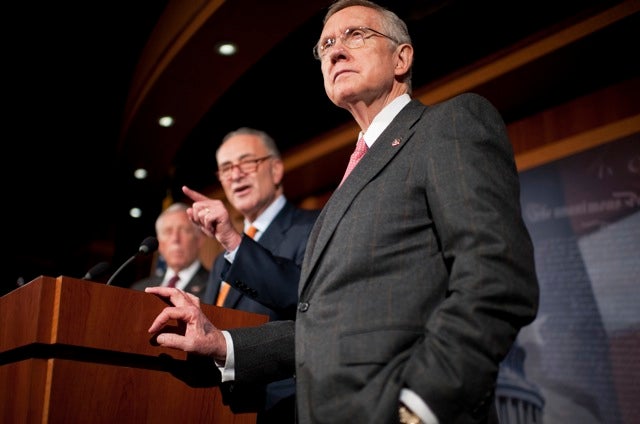By the time Senate Majority Leader Harry Reid (D-NV) took to the floor Monday to berate Republicans for supposedly blocking emergency disaster aid, the Federal Emergency Management Agency had already announced it did not need the money Reid claimed was being blocked.
FEMA’s disaster relief fund became a key issue in the continuing resolution the Senate passed Monday night, funding the federal government through Nov. 18. A record number of emergency declarations this year by President Obama stretched FEMA’s fund to the brink.
Republicans offered an additional $1 billion in disaster aid, but coupled it with cuts to a pair of green energy programs, including one that financed defunct solar company Solyndra. Democrats then accused GOP lawmakers of withholding disaster aid for political purposes.
A look at the progression of events surrounding the battle over supplemental funding for FEMA shows that Senate Democrats accused Republicans of blocking FEMA funding even after they were informed the funding wasn’t actually needed.
Here’s a timeline of events dating from August to the Senate’s passage of legislation Monday night.
Aug. 31: Responding to Republicans’ insistence that any hike in disaster aid funds be offset, FEMA Director Craig Fugate insists that the agency has enough money to sustain operations. “We don’t know what’s coming down the line, but what I do know is we have funds to continue response, rescue operations and immediate needs and that’s been our focus,” Fugate says.
Sept. 9: President Obama requests $500 million in emergency appropriations for FEMA’s disaster aid funds. Republicans maintain that the money be offset with cuts elsewhere in the budget.
Sept. 15: The Senate approves a measure offered by Reid to immediately grant FEMA an additional $500 million for disaster aid for the remainder of the fiscal year, which ends Sept. 30.
Sept. 20: Reid asks the White House whether FEMA actually needs additional funds to sustain its disaster aid operations. “The White House was non-committal,” according to Politico.
Sept. 22: The House of Representatives approves a continuing resolution that hikes FEMA disaster aid by $1 billion, and offsets the cost with $1.5 billion in cuts to a pair of Energy Department programs.
Sept. 22: Reid convenes Senate Democrats to discuss their position on the House measure. “The caucus decided it would fight the GOP proposal and try to make the case that the offsets were unfair and would cost jobs,” according to Politico.
Sept. 23: Reid insists that FEMA “will run out of money on Monday. I repeat: Monday.”
Sept. 24: Fugate contacts Reid to inform him that the Monday date was inaccurate. Other administration officials reportedly called Reid’s office to express confidence that FEMA could make it through the year.
Sept. 26, 12:30 p.m.: FEMA confirms that it has the funds to sustain disaster aid operations through the end of the fiscal year. As of Monday morning, it had $114 million on hand for the week, and said it could find another $40 million originally marked for longer-term projects.
Sept. 26, 3:30 p.m.: Reid takes to the Senate floor to slam Republicans for “block[ing] FEMA from getting the resources it needs to help disaster victims.”
Sept. 26, 7 p.m.: The Senate passes the continuing resolution with no additional FEMA funding for this fiscal year. Reid says it “will provide suffering Americans from Missouri to Vermont the resources they need to piece their lives back together.”
The sequence of events raises serious questions that deserve answers, most importantly, What did Obama and Reid know, and when did they know it? Reid’s office did not respond to a request for comment.
“You kind wonder about FEMA’s credibility on these issues, when they say they’re out of money tomorrow and now they’re out of money at the end of the fiscal year,” Sen. Roy Blunt (R-MO) told Politico. “If you can come up with four more days of disaster funding after you said you’d run out, it will be interesting to see how they came up with that four days of funding.”
Emergency spending, of course, has long been a problem for Washington. Even under President Bush, lawmakers abused the process to attach their own pet projects to war supplementals and disaster aid.
Writing for Heritage in 2008, Brian Riedl observed, “The emergency designation should be reserved for truly unanticipated national emergencies rather than routine defense and domestic spending. … Unless this abuse is curtailed, ’emergency’ spending will continue to push the federal budget toward trillion-dollar deficits.”
Three years and one credit rating downgrade later and these tricks are still being tried.




























